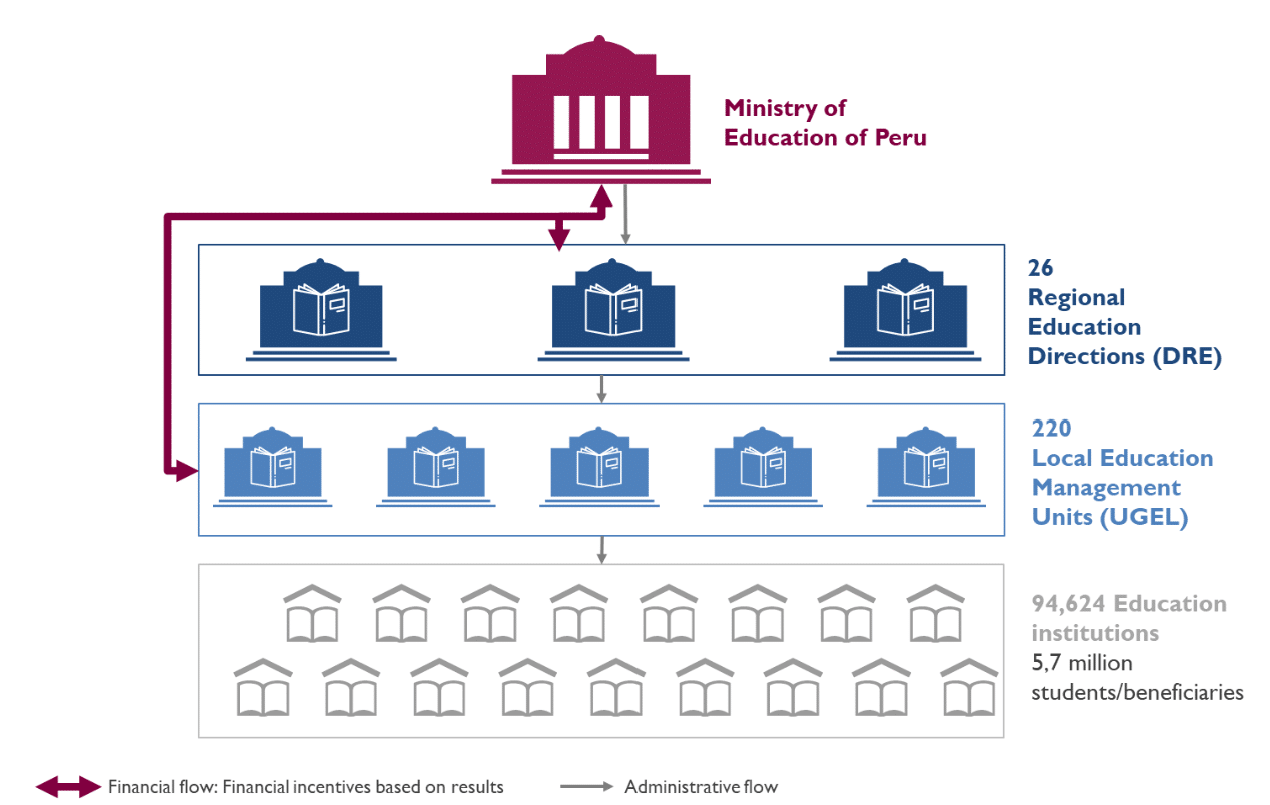Overview
Type of Project |
Long-term deep country systems change |
Strategic Pillar |
Government Partnerships |
Sector |
Education |
Region |
Latin America and the Caribbean |
Country |
Peru |
Abstract
Instiglio worked with the Ministry of Education of Peru in 2017 in the redesign of “Compromisos de Desempeño,” a Performance-Based Grant between the central Government and local and regional education government agencies. This program conditioned USD 45 million worth of transfers to the achievement of students’ learning outcomes, adequacy of learning materials, student, principals, and teacher attendance, among other metrics. The program involved 26 Regional Education Directions, 220 Local Education Management Units, and 94,624 education institutions, reaching 5.7 million students/beneficiaries.
Project
Partners

The issue
In 2003, the General Law of Education decentralized Peru’s education system, granting regional and local governments financial autonomy in managing educational resources. Despite this reform, the education system faced significant challenges in ensuring that children receive a quality education, as evidenced by low levels of reading comprehension and math skills, as well as heterogeneous results among regions. For instance, in 2016, only 46.4% of boys and girls in second grade had adequate reading comprehension and an even lower percentage, 34.1%, could do basic math operations. These poor outcomes reflected a lack of capacity among local governments to deliver high-quality educational services, with inadequate support and resources leaving many children without the educational opportunities they deserve.
The response
To improve Peru’s education public administration and results, MINEDU and Instiglio created a multi-year partnership to enhance the ability of local education agencies to deliver high-quality educational services.
Working in partnership, we conducted a detailed performance diagnostic which established that results were being constrained by weak incentive alignment caused by serious stakeholder misalignment and a profusion of conflicting objectives that reduced attention to key results. Responding to this, we led the collaborative design of incentive payments that redefined the performance relationship between the central ministry, regional education directorates, and schools. This entailed introducing RBF for USD 45m of funding for 246 government regional and local education agencies, conditioning funding on measures such as enrollment and student learning, and driving attention to what really matters – children’s learning outcomes.
The impact
These reforms have driven real change, with a MINEDU evaluation finding this program to be the most cost-effective in supporting improved learning outcomes for almost 6 million students. Impressive results included increased scores in reading comprehension and math, as well as improved performance in critical areas such as timely hiring of teachers, approval of enrollment lists, and delivery of educational material.
These include:
- The scores in reading comprehension increased on average by 22 points and the proportion of students in the highest levels of achievement increased by 7%
- The scores in math increased on average by 32 points and the proportion of students in the highest two levels of achievement in math increased by 10%.
- Timely hiring of teachers increased from 87% to 96%
- Approval of enrollment lists (enrolled students) increased from 52.8% to 87.2%
- Timely and relevant delivery of educational material programmed by the Ministry of Education increased from 71.4% to 92%
In addition to improving outcomes, the program established new standards of performance for delivery leaders at the Ministry and broader reform initiatives with further transformative potential. For example, in 2020, we collaborated with MINEDU again to redesign a similar program to incentivize better performance of public universities with a focus on improving the quality of the education provided by these institutions.


